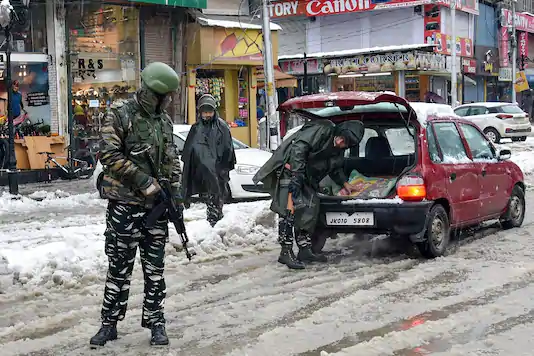
SOURCE: CNN-NEWS18
The army and police in Jammu and Kashmir are mulling to provide ample time to holed up local militants to surrender rather than go for kills, senior officials told News 18. In a related development, the top brass of the security establishment has proposed to the Centre the formalisation of an effective surrender and rehabilitation policy for those who choose to come out of live encounters and abjure violence after a close brush with militancy. This, they feel, will encourage the ‘boys with guns’ to quit violence and lead a normal life.
“We are willing to give a chance to these militants to survive. Help from government, society and peers will provide him live a dignified life. The civil society has a role to play, to make him acceptable to his people,” a senior army official in the know of such developments told News18.
The rethink or modification to give more opportunities to fresh recruits stems from the fact that a bulk of them have spent only a few days to weeks in militancy and hence they need to be given a second chance. Officials are also looking at instances where out of the 175 militants killed in 78 encounters till October 15 of this year, nearly 80 were recruits of 2020. Similarly out of 50 arrested, 40 had joined militancy this year only.
Officials have also found that in many instances, these recruits were carrying only pistols, clearly suggesting they were neither well-equipped nor trained. Out of 80 new recruits killed in 2020 so far, more than half of them did not have rifles; 39 had pistols, 21 had rifles, three were unarmed, and even weapon types of 13 militants could not be ascertained.
“Killing a militant does not mean you kill militancy. We have killed thousands of militants since 1990, effected huge arms seizures, yet militancy is not finished. There is no harm if we modify our operations a bit,” the officials said.
In the last few weeks, two militants trapped in separate encounters surrendered before the security forces. In another case, a video of a bare-chested militant emerging out of orchards to surrender before police and army officials went viral.
The video, where officials appear to treat the militants humanely, sources said, was to encourage more youth to give up arms. The Valley’s militant outfits had, however, termed the video a “drama and a piece of propaganda.”
“We realise some boys pose pictures with guns and then upload them on social media before joining militant ranks but they are naive and do it out of peer pressure and romanticism of gun. This forces them to take hasty and dangerous decisions,” said the army official.
“If an operation is not complicated, we are willing to give him opportunity to live.”
“It is a tough call because field commanders don’t know what a cornered militant is carrying. A pistol, yes, but we aren’t sure how many grenades,” another official said, adding that there are clear directions that we must first try to convince the militants to come out alive.
The SOP during encounters is that parents or relatives are called to the spot and made to appeal to trapped militants to lay down arms. “If they heed to their call..minor charges are slapped on them and within months they may be let off,” said a police officer who has been dealing with militancy operations since last two decades.
“It is important that we follow up on the surviving militant and ensure his rehabilitation.”
In the past, both Omar Abdullah and Mehbooba Mufti-led governments had worked on surrender and rehabilitation policies.
The Omar Abdullah government had encouraged the surrender and return of stranded Kashmiri militants in Pakistan through Nepal during his tenure and as head of the unified command, Mufti had instructed security forces to focus more on arrests than kills during encounters.
She had even stated those teams who effected arrests during gunfights would be given double the prize money than kills. However, with the exit of their governments, these policies could not be continued.






